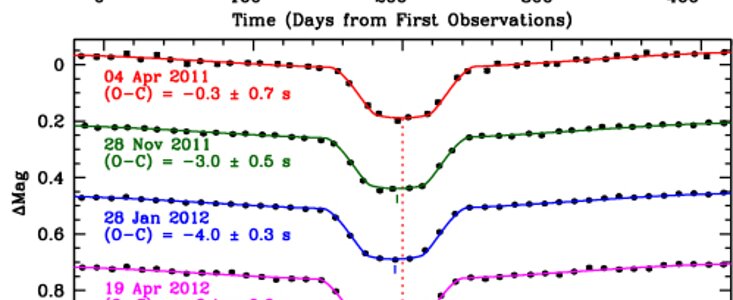Gemini Observations Play Key Role in Testing Einstein’s Theories
28 Agosto 2012
A research team led by University of Texas at Austin astronomy graduate student J.J. Hermes used the Gemini North telescope on Mauna Kea Hawai‘i to observe two white dwarf stars in a close gravitational embrace. Based on this work with Gemini and several other telescopes, Hermes and his team confirmed that the pair’s grip on each other is tightening very quickly. So quickly in fact, that the change in the pair’s period (slightly less than 13 minutes) is measurable (even over the tenure of a graduate student!) These measurements help confirm another ramification of Einstein’s General Theory of Relativity, which holds that the energy the pair loses in the shortened period is carried away in gravitational waves.
The team’s paper, to be published in The Astrophysical Journal Letters, finds that the pair’s period loses about 0.25 milliseconds per year, which is almost exactly what the General Theory of Relativity predicts. In the University of Texas press release, Hermes adds that from our perspective on Earth these stars eclipse each other every six minutes, making them, “… an unparalleled and accurate clock some 3,000 light-years away.”
The Gemini observations, using the Gemini Multi-Object Spectrograph (GMOS) on the Gemini North telescope, augment over a year of study following discovery of the binary system in 2011 with the 2.1-meter Otto Struve Telescope at the University of Texas’ McDonald Observatory. The current observations totaled over 200 hours, from the 10.4-meter Gran Telescopio Canarias in the Canary Islands of Spain and the 3.5-meter Apache Point telescope in New Mexico, in addition to those from Gemini and McDonald. Besides the rapid photometry to measure the orbital period, the Gemini data helped to constrain the secondary star’s luminosity and temperature.


